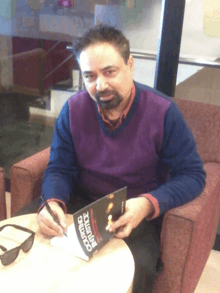Rajesh Talwar
Rajesh Talwar is a lawyer and writer from India. He has written several books on the topics of law and human rights.[3]
- Not to be confused with the convict in the 2008 Noida double murder case.
Rajesh Talwar | |
|---|---|
 | |
| Alma mater | University of Nottingham |
| Occupation | Writer,[1] lawyer[2] |
| Website | rajeshtalwar |
Early life
Talwar studied Economics at HIndu College at the University of Delhi.[4] Subsequently he went to the University of Nottingham after going to the UK on a British Chevening scholarship in 1996. He received his LL.M in Human Rights Law. He has also participated in a programme on Negotiation at the Harvard Kennedy School of Government[5] studied Forced Migration at the University of Oxford and been awarded a Post Graduate Diploma from the London School of Journalism[6]. He began working for the United Nations in various capacities. His work with the U.N. took him to places such as Kosovo, Afghanistan, Timor-Leste,[7]Somalia and Liberia.[8]
Career
Talwar is both a practitioner and professor of law. He has previously taught LL.B students at both Delhi University and Jamia Millia Islamia.[9]
Talwar's career in writing includes writing on different subjects for major media outlets including The Guardian, The Economic Times,[10] The Sunday Mail, and The Pioneer.[11] He has also published books on the topic of law, addressing law reform as well as trying to demystify the subject[12] such as in 'How to Choose a Lawyer - and Win Your Case.'[13]
Talwar's novels include An Afghan Winter[14] and The Sentimental Terrorist,[15] both based in Afghanistan, where he spent many years as a UN staffer. Kirkus Reviews describes the latter novel as 'a compelling narrative' that 'will haunt the readers long after the last page.'[16] His children's books include The Three Greens (Orient BlackSwan)[17] and The Bearded Prince. According to Mark Mclaughlin, writing for Foreword Reviews, in the latter story, 'without including magic, witches, curses, violence, or villains of any sort,' the author 'has lovingly crafted a short but big-hearted tale of a princess choosing a suitor.'[18][18] His novels also include Inglistan (2007), which a reviewer for The Hindu called "sometimes tedious but readable",[19] while a reviewer for the Book Review Literary Trust said it was "a autobiographical sounding and rather uninteresting personal account, with all the signs of an amateurish self-expiation".[20] Talwar has also written plays, including High Fidelity Transmission[21] on discriminatory policies and illegal testing of AIDS vaccines in India[22] and the 2001 satire Inside Gayland that depicted an Indian heterosexual man who visited a planet where heterosexuality is against the law as immoral and unnatural.[2] His most recent non-fiction publication Courting Injustice: The Nirbhaya Case and Its Aftermath (Hay House) is based on the December 2012 Delhi gang rape case.[23] In fiction he has most recently published 'How to Kill a Billionaire' (Juggernaut Books; 2016)[24]
References
- Pradhan, Bharathi (15 December 2013). "A Life Not So Gay". The Telegraph. India. Retrieved 25 February 2014.
- Usami, Zeeshan-UI-Hassan (2007). Beyond Boundaries: Reflections of Indian and U.S. Scholars. iUniverse. ISBN 9780595436446.
- https://www.linkedin.com/in/rajesh-talwar-493ba79/
- http://www.hayhouse.co.in/AuthorDetail.aspx?Id=dyUM8pQ1wbU=
- "Home". RAJESH TALWAR. Retrieved 18 October 2019.
- https://www.un.org/en/peacekeeping/documents/Legal%20Affairs_30%20Jun%202015.pdf
- "United National Assistance Mission in Afghanistan" (PDF). Office of Internal Oversight Services. 27 November 2013. Retrieved 26 February 2014.
- "Rajesh Talwar Author Biography". Hay House India. Retrieved 26 February 2014.
- Talwar, Rajesh (February 1991). "Witness for the prosecution". The Economic Times.
- Talwar, Rajesh (9 April 1992). "The case of the reluctant witness". The Pioneer.
- "Demystifying the Complexity of Litigation in India". The New Indian Express. Retrieved 18 October 2019.
- "How to choose a lawyer". The Statesman. 2 April 2015. Retrieved 18 October 2019.
- "Review of The Sentimental Terrorist". www.forewordreviews.com. Retrieved 18 October 2019.
- AN AFGHAN WINTER by Rajesh Talwar | Kirkus Reviews.
- THE SENTIMENTAL TERRORIST by Rajesh Talwar | Kirkus Reviews.
- "Archived copy". Archived from the original on 4 January 2015. Retrieved 4 January 2015.CS1 maint: archived copy as title (link)
- "Review of The Bearded Prince". www.forewordreviews.com. Retrieved 18 October 2019.
- Choudhury, Sonya Dutta (4 February 2007). "Comparisons and contrasts". The Hindu. Retrieved 1 December 2014.
- Bhaduri, Saugata (6 June 2008). "If Only Life Offered Second Chances". The Book Review India. India. Retrieved 25 February 2014.
- "Inter-Actions". Inter-Actions. 28 November 2014. Retrieved 18 October 2019.
- Needle, Chael. "High Fidelity Transmission: Review | A&U Magazine". Retrieved 18 October 2019.
- "Book extract: Solution?". Mid-Day. 27 November 2013. Retrieved 25 February 2014.
- http://community.juggernaut.in/tag/how-to-kill-a-billionaire/